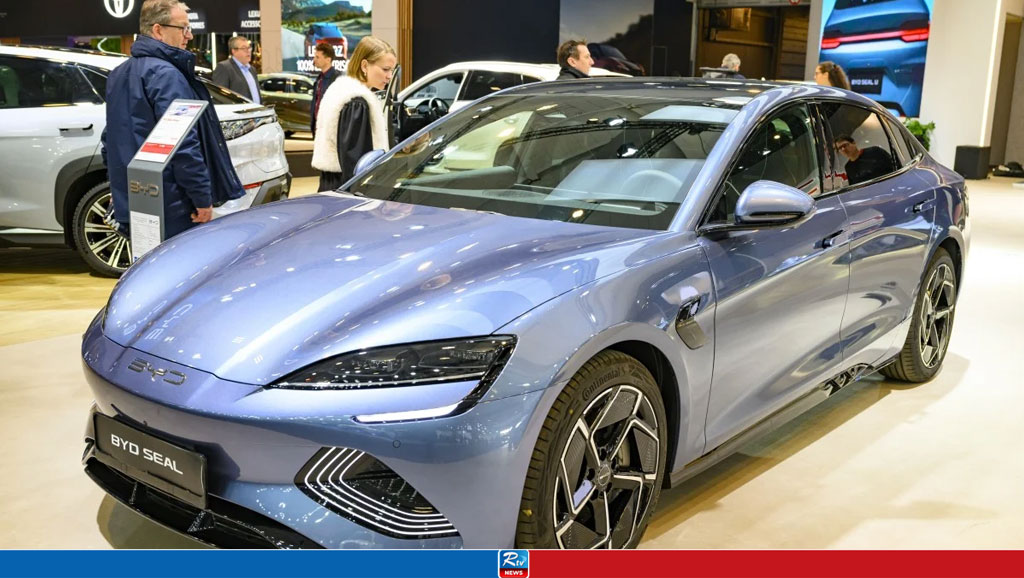China's electric vehicle shipments to the European Union defied the bloc's newly imposed tariffs to report a surprise uptick in December, prompting market worries that Sino-European trade tensions could escalate further in 2025.
The volume of Chinese electric vehicles exported to the EU rose to 32,849 units in December, up 8.3 per cent year on year, according to Chinese customs data released on Monday.
The gains reversed two consecutive months of sharp declines largely driven by the EU's decision to raise tariffs on Chinese EVs by up to 45 per cent starting from October. Sales in October plunged almost 40 per cent, while November sales were down by a quarter.
Do you have questions about the biggest topics and trends from around the world? Get the answers with SCMP Knowledge, our new platform of curated content with explainers, FAQs, analyses and infographics brought to you by our award-winning team.
The EU remained the top buyer of Chinese EVs in 2024, purchasing nearly 30 per cent of China's outbound shipments. But the 27-nation bloc saw its total annual imports of Chinese EVs fall 6 per cent year on year in 2024.
The major European buyers of Chinese EVs were Belgium, Germany, Spain, Netherlands and Romania, according to the data.
An increase in volume but a decrease in value reflects falling prices, which is the key concern of European policymakers Nick Marro, economist. Analysts warned there was a high risk of a further deterioration in EU-China ties this year, with more trade products potentially being targeted by protectionist policies.
"The EU tariffs implementation had a significant impact on China's EV exports," said Liang Yan, an economist at Willamette University in Oregon.
She added that Chinese carmakers had adapted by increasing exports of plug-in hybrid vehicles, which are not subject to higher EU tariffs. Exports of those vehicles tripled during the first 11 months of last year, according to Liang.
Overall, China's EV exports increased by 7.2 per cent year on year to 1.65 million units in 2024, which represented one-fifth of its annual production. But the value of those exports fell by 6.3 per cent to US$31.97 billion, the first decline since the data was first made available in 2018.
"An increase in volume but a decrease in value reflects falling prices, which is the key concern of European policymakers," said Nick Marro, principal economist for Asia at the Economist Intelligence Unit. "Domestic price wars in China are bleeding into the international arena."
Last year, customs data showed a clear trend of Chinese electric vehicles being exported at lower cost. The unit price of Chinese EV exports to the EU, Latin America and Central Asia experienced declines ranging from 4.6 per cent to 39 per cent.
Marro expected Beijing and Brussels to continue bilateral negotiations to prevent tensions from worsening, but he warned that medical devices, wind turbines and government procurement practices are all potential triggers for another conflict.
"The amount of grievances alone points to another challenging year, even US trade policy becomes a bigger distraction for both sides this year."
Beijing views the success of its electric vehicle industry, which was the country's seventh-largest export item last year, as evidence of China's move up the industrial value chain.
It has denied accusations of industry overcapacity even as several of its foreign partners have launched investigations and raised trade barriers against Chinese products.
Liang from Willamette University said Chinese carmakers had also been able to lower production costs and prices due to their improving technology and economies of scale.
"We are likely to see more consolidation in the industry going forward, with BYD, Geely and Xiaomi leading the way, so prices will gradually stabilise," she said.
China's domestic auto demand is likely to remain high in 2025, Liang said, with the Chinese government predicted to extend and expand its trade-in programme in an attempt to boost consumption.
Elsewhere, China's EV exports to ASEAN, or the Association of Southeast Asian Nations, and Latin America grew 9.24 per cent and 103 per cent year on year in 2024, respectively.
China's domestic auto sales reached a record high of 31.4 million in 2024, up 4.5 per cent year on year, driven by Beijing's trade-in programme and other subsidy policies, according to the China Association of Automobile Manufacturers.
Sales of domestic new energy autos, including electric vehicles, jumped 35.5 per cent year on year to 12.9 million units.

